- Home
- W. Somerset Maugham
A Writer's Notebook Page 5
A Writer's Notebook Read online
Page 5
Prostitution will have to be legally as well as tacitly recognised. The chastity of women before marriage will come to be considered of less moment.
I was wrong about prostitution, but right about chastity.
Why should not one cultivate sensations? Pleasure arises from sensations gratified; whether solicited or not. It is only their after-effects that must be considered. When Spencer says it is wrong to solicit sensations, he is influenced by his Wesleyan birth, the influence of which he has never escaped. He expressly approves the pursuit of æsthetic delights such as are found in travelling.
One can only rule men by dogmatic affirmations. That is why men of strong opinions, prejudices and enthusiasms, and not philosophers, are the leaders of the people. But the philosophers console themselves by thinking that they do not want to lead an ignoble rabble.
A moral code is only accepted by the weak-minded; the strong form their own.
Capri. I wander about alone, forever asking myself the same questions: What is the meaning of life? Has it any object or end? Is there such a thing as morality? How ought one to conduct oneself in life? What guide is there? Is there one road better than another? And a hundred more of the same sort. The other afternoon I was scrambling among the rocks and boulders up the hill behind the villa. Above me was the blue sky and all around the sea. Hazy in the distance was Vesuvius. I remember the brown earth, the ragged olive trees, and here and there a pine. And I stopped suddenly, in confusion, my head buzzing with all the thoughts that seethed in it. I could make nothing out of it all; it seemed to me one big tangle. In desperation, I cried out: I can’t understand it. I don’t know, I don’t know.
A rough day in the Bay of Naples. The Neapolitans vomited great platefuls of undigested macaroni. They vomited with a sudden rush, like water escaping from a burst main, and their gaping mouths gave them the stupid, agonised look of a fish out of water, but you can’t bang them on the head to put them out of their misery as you do with a fish you’ve caught. Besides, you have nothing to bang them with.
I suppose it is to the Jews that we owe our idea of the sanctity of home life. They found in their home safety and peace from the turmoil and persecution of the world without. It was their only refuge and so they loved it, but they loved it because of their weakness. The Greeks seem to have had no home life. No one has accused them of domesticity. Full of energy, eager, abounding as perhaps no other people has been with the joy of living, they looked upon the world as a battle place; and the din of warfare, the shouts of triumph, even the groans of the vanquished were music in their ears. They flung themselves into the business of life as a fearless swimmer breasts the waves.
One of the commonest errors of the human intelligence is to insist that a rule should be universally applicable. Take an instance in Anatomy. Out of twenty cases the branch of an artery in eight will arise from the second part of the root, in six from the first, and in six from the third. Though the exceptions surpass it, the rule will be that it arises from the second part.
The great majority use quite ignobly the portion of intelligence they have over after providing for their self-preservation and the propagation of their species.
I think it possible that, having arrived at a certain high stage of civilisation, men will wilfully revert to barbarism; or fall back from inability to maintain the high level they have reached.
Everything in life is meaningless, the pain and the suffering are fruitless and futile. There is no object in life. To nature nothing matters but the continuation of the species. And is not this last a hasty proposition based on over-brief periods of time, the observation of an eye that sees but a little way?
May death cover my years with night.
1897
The spirituality of man is most apparent when he is eating a hearty dinner.
T. was standing at a railway station; a woman came up to him and told him that he had prosecuted her in a criminal action, and he was so kind that she wanted to thank him. She wanted above all to assure him that she was innocent. He couldn’t even remember her face. What to her was a tragic and dreadful ordeal to him was no more than a drab little incident which had slipped his memory.
A Thames waterman was in love with a girl and couldn’t take her on the spree for lack of money. He saw a body in the water, a man who gave some last signs of life; but he got no money for saving a live man, so he put his hook in his clothes and dragged him in. The man was landed, and a bystander said he wasn’t quite dead. The waterman turned upon him and blackguarded him. He laid the man on his face and effectually prevented him from recovering. So he got his five shillings and took his donah out.
Three women were charged at the police court. They were whores. Two were strong and healthy, but the third was dying of consumption. The first two had money and paid their fines, but the third had none. Fourteen days. In a little while the two came back, having pawned their jackets notwithstanding the cold, and paid the fine. They refused to let the girl go to the workhouse infirmary. “We’ll see the last of her,” they said, and all three went into a brothel. They looked after the dying girl for a month, and then she died. They paid for her funeral, to which they went, each with a wreath, in new black dresses, driving in a cab behind the hearse.
A woman sat looking at her husband. He was in bed drunk, and it was the twentieth anniversary of their wedding. When she married him she thought she was going to be happy. Married to an idler, a drunkard and a brute, her life had been one of hardship and of misery. She went into the next room and took poison. She was taken to St. Thomas’s and recovered, but then was charged at the police court with attempted suicide. She said nothing to excuse herself, but her daughter stood up and told the magistrate all her mother had had to suffer. She was given a separation order under which she was to receive fifteen shillings a week. The husband signed the deed of separation and, having done this, put down fifteen shillings, saying: “Here’s your first week’s money.” She picked it up and flung it in his face. “Take your money,” she screamed, “give me back my twenty years.”
The other day I went into the theatre to see a Cæsarian. Because it’s rarely done it was full. Before starting Dr. C. made a short discourse. I didn’t listen very attentively, but I seem to remember his saying that the operation so far was seldom successful. He told us that the patient couldn’t have a child naturally and had had to be twice aborted; but she’d set her heart on having one now that she was pregnant again and though he’d explained the danger to her and said that it was only an even chance that she’d come through, she’d told him that she was prepared to risk it. Her husband wanted it too, and that seemed to weigh with her. The operation appeared to go very well and Dr. C’s face beamed when he extracted the baby. This morning I was in the ward and asked one of the nurses how she was getting on. She told me she’d died in the night. I don’t know why, it gave me a shock and I had to frown because I was afraid I was going to cry. It was silly, I didn’t know her, I’d only seen her on the operating table. I suppose what affected me was the passion of that woman, just an ordinary hospital patient, to have a baby, a passion so intense that she was willing to incur the frightful risk; it seemed hard, dreadfully hard, that she had to die. The nurse told me the baby was doing well. That poor woman.
The cri du cœur is never without its effect, but the odd thing is that it need never come from the heart at all; it need only be perfectly simulated, and the trick is done.
A big dinner-party is merely an opportunity for the common indulgence of sensual appetites.
The Vicar expounded twice on Sunday the more obvious parts of the Scriptures, in twenty minutes or so, making for the benefit of the vulgar a number of trite reflections in a slovenly language compounded from the Authorised Version and the daily papers. He had a great facility for explaining earnestly and at decorous length texts which were plain to the poorest intelligence. His offertories were devoted alternately to the poor of the parish and to the necessities of the church. He saw a c
onnection between the need for coal to warm the vestry and for candles to light the altar and the dogmas of religion. So on these occasions he made it his practice to attack the scarlet weeds of heresy, expounding to an intelligent congregation of yokels and small boys, the difficulties of the Athanasian Creed. But he was at his best when he poured the withering vials of his contempt on the false crowd of Atheists, Romanists, Dissenters and Scientists. He could barely keep serious in his scorn for the theories of evolution; and would set up like a row of ninepins the hypotheses of philosophers and learned men and knock them down by the aid of his own fearless intellect. It might have been a dangerous experiment but that his congregation were convinced beyond the need of argument of the faith of their fathers, and not very attentive listeners.
1900
When a woman of forty tells a man that she’s old enough to be his mother, his only safety is in immediate flight. She’ll either marry him or drag him through the divorce court.
One should always cultivate one’s prejudices
Cornwall. The wind dragged up the sea by its roots and the water in heavy dark masses hurled itself against the rocks. Overhead the sky was in frantic motion, the tormented clouds raced across the night and the wind whistled and hissed and screamed.
Fragments of cloud, tortured and rent, fled across the sky like the silent souls of anguish pursued by the vengeance of a jealous God.
There was a moaning of thunder in the distance and one by one fell the first rain-drops; they were like the tears of God.
The wind was like a charioteer in a chariot, and the horses, muscles straining, quivered in their traces; he lashed them furiously with his whip and they sprang forward with a rush and a whirl, and the morning air was rent with a long, shrill scream as though women in panic fled a danger there was no escaping.
I wandered at random, and the soft ground, broken by the tortuous courses of a hundred streamlets, with its carpet of brown, dead leaves, exhaled an odour of moist soil, the voluptuous scents of our mother, the Earth, gravid with silent life. The long branches of the briar-rose entangled my feet. Here and there, in sheltered corners, blossomed the primrose and the violet. The delicate branches of the beech trees were black amid the young leaves, vivid and tender, that had but just burst their buds. It was an emerald paradise. The eye could not pierce that intricate greenery. It was a filagree finer upon the slender twigs than the summer rain and more subtle than the mists of sunset. It was as intangible as a beautiful thought. It was a scene that drove away all thought of the sadness and the bitterness of life. The verdure was so pure that my mind became pure also and I felt like a child. Here and there, far above the other trees, rose a fir, immensely tall, straight as a life without reproach; but cheerless, cold and silent. The only sound was the rustling of a rabbit among the dead leaves or the hasty springing of a squirrel.
After the rain, in the evening, the birds broke into such a joyous chant that it seemed impossible that it was a world of sorrow. Hidden among the leaves, aloft in the beeches, the starling sang with full-throated melody; and the bullfinch and the thrush. From a distant meadow a cuckoo called with endless repetition, and far away, like an echo, a second cuckoo called back.
The Green Park in Winter.
The snow fell lightly as the footsteps of children. The snow lay masking the trim pathways, shrouding the trodden grass, the snow as far as one could see, on the housetops, on the trees. The sky was low, heavy with the cruel cold, and the light was grey and dim. In a long line gleamed the round lamps, and entangled with the leafless trees was a violet mist, and it trailed along the ground like the train of the winter night. The piercing cold had killed the other colours, but the mist was violet, exquisitely soft, but cold, cold so that the weary heart could scarcely endure its anguish. The houses of Carlton House Terrace were dark menacing masses against the whiteness of the snow. The day dwindled away in a ghostly silence, and there was no glimpse even of the setting sun. The grey sky grew darker, and the lights gleamed more brightly, surrounded each one by a pale aureole.
London. The western clouds of the sunset were like the vast wing of an archangel, flying through the void on an errand of vengeance; and the fiery shadow cast a lurid light upon the city.
The buttercups were spread over the green meadow like a cloth of gold, a carpet for the king’s son Fleur-de-Lys, and Jonquil the white-limbed shepherd’s boy
Over the trees, entangled in the naked branches, floated the thin black clouds like the rags of some ample sinuous garment.
The thin black clouds dragged themselves through the tree tops, tearing raggedly among the naked branches.
The aerial, oceanic petrel.
The dark immovable clouds were piled upon one another in giant masses, so distinct and sharply cut, so rounded, that one almost saw the impression of the fingers of a titanic sculptor.
There was a clump of tall fir trees, dark and ragged, their sombre green veiled in a silver mist, as though the hoar-frost of a hundred winters had endured into the summer as a chill vapour. In front of them, at the edge of the hill up which in serried hundreds climbed the pine trees, stood here and there an oak just bursting into leaf, clothed with its new-born verdure like the bride of a young god. And the everlasting youth of the oak trees contrasted, like day and night, with the undying age of the fir.
The fir trees were like the forest of life, that grey and sombre labyrinth where wandered the poet of Hell and Death.
The fields were fresh with the tall young grass of spring, the buttercups flaunted themselves gaily, careless of the pitiless night, and rejoiced in the sunshine as before they had rejoiced in the enlivening rain. The pleasant raindrops still lingered on the daisies. The feathery ball of the dandelion, carried away by the breeze, floated past, a symbol of the life of man, an aimless thing, yielding to every breath, useless and with no mission but to spread its seed upon the fertile earth, so that things like unto it should spring up in the succeeding summer and flower, uncared for, and reproduce themselves and die.
I didn’t know then how succulent a salad can be made of this humble herb.
The hawthorn hedges, well-trimmed and flourishing, were putting out their tiny buds, and here and there, already in full flower, bloomed the wild rose.
At sunset over the slate-grey of the western clouds was spread a fiery vapour, a rain of infinitesimal tenuity, a great dust of gold that swept down upon the silent sea like the train of a goddess of fire; and presently, thrusting through the sombre wall of cloud like a titan bursting the walls of his prison, the sun shone forth, a giant ball of copper. With almost a material effort, it seemed, it pushed aside the obstructing clouds, filling the whole sky with brilliancy; and then over the placid sea was stretched a broad roadway of flame upon which might travel the passionate souls of men, endlessly, to the source of deathless light.
The clouds hung over the valley pregnant with rain; and it gave a singular feeling of discomfort to see them laden with water and yet still painfully holding it up.
The pine wood was cool and silent, fitting my humour. The tall trunks, straight and slender like the masts of sailing boats; the gentle aromatic odour; the light subdued; and the purple mist, so tenuous as to be scarcely discernible, a mere tinge of warmth in the atmosphere—it all gave me an exquisite sense of rest. My footfall on the brown needles was noiseless, and the tread was soft and easy. The odours filled me with a drowsy intoxication, like an Eastern drug. The tints were so soft that one could not believe it possible for paints and paintbrushes to reproduce them; the faintly-coloured air visibly surrounded things and softened their outlines. A pleasant reverie possessed me, unanalysable, a waking dream of half-voluptuous emotion.
How fortunate is his lot who can accept the charming emotions that Nature gives him without trying to analyse the charm!
The wind sighed through the pine trees with the pitifulness of a girl sighing for a love that was dead.
The field all yellow with countless buttercups, a spring carpet wher
eon might fitly walk the angels of Messer Perugino.
It was a concert of endless variety; in every hedgerow, in the branches of every tree, hidden among the leaves, sang the birds. Each one, as though trying to outsing the rest, sang as if his life depended on it, and as if life were irresponsible and joyous.
The country was undulating and afforded spacious views of verdant hills and fat Kentish fields. It was the most fertile part of the county and thickly wooded. Elms, oak trees and chestnuts. Each generation had done its best, and the country was tended like a garden.
It was a landscape as formal as Poussin’s or Claude’s. It had no abandon, no freedom; the hand of man was perpetually obvious in the trimness and in the careful arrangement.
Sometimes, from a hill a little higher than the rest, I could look down into the plain bathed in sunlight, golden and dazzling. The fields of corn, the fields of clover, the roads and the rivulets, formed themselves, in that flood of light, into an harmonious pattern, glowing and ethereal.

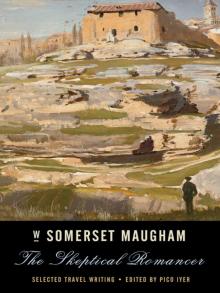 The Skeptical Romancer: Selected Travel Writing
The Skeptical Romancer: Selected Travel Writing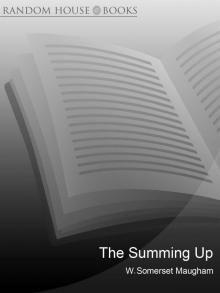 The Summing Up
The Summing Up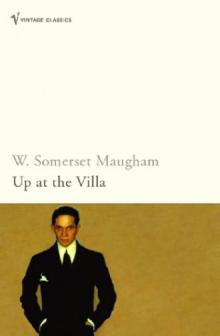 Up at the Villa
Up at the Villa The Razor's Edge
The Razor's Edge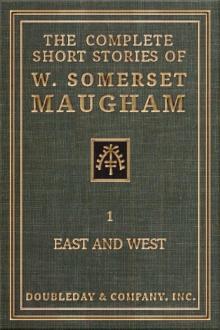 The Complete Short Stories of W. Somerset Maugham: East and West (Vol. 1 of 2))
The Complete Short Stories of W. Somerset Maugham: East and West (Vol. 1 of 2))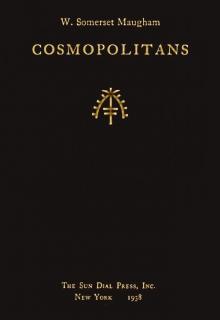 Cosmopolitans
Cosmopolitans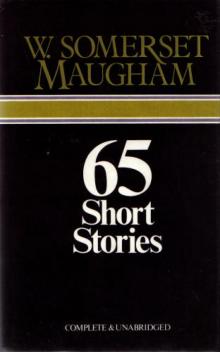 65 Short Stories
65 Short Stories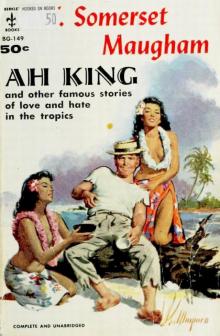 Ah King (Works of W. Somerset Maugham)
Ah King (Works of W. Somerset Maugham)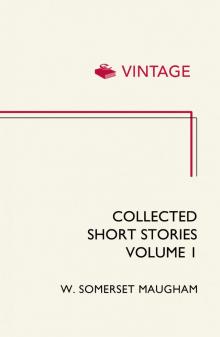 Collected Short Stories: Volume 1
Collected Short Stories: Volume 1 Collected Short Stories Volume 2
Collected Short Stories Volume 2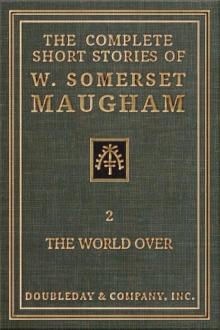 The Complete Short Stories of W. Somerset Maugham - II - The World Over
The Complete Short Stories of W. Somerset Maugham - II - The World Over Collected Short Stories Volume 4
Collected Short Stories Volume 4 Theatre
Theatre Short Stories
Short Stories Then and Now
Then and Now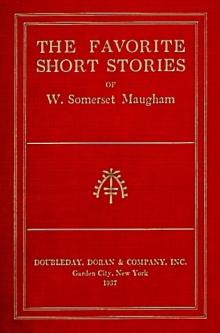 The Favorite Short Stories of W. Somerset Maugham
The Favorite Short Stories of W. Somerset Maugham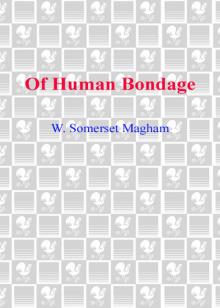 Of Human Bondage
Of Human Bondage The Magician
The Magician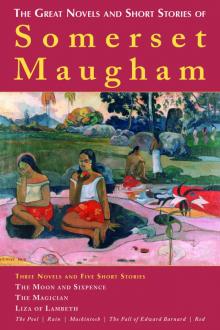 The Great Exotic Novels and Short Stories of Somerset Maugham
The Great Exotic Novels and Short Stories of Somerset Maugham A Writer's Notebook
A Writer's Notebook Christmas Holiday
Christmas Holiday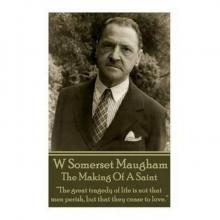 The Making of a Saint
The Making of a Saint Merry Go Round
Merry Go Round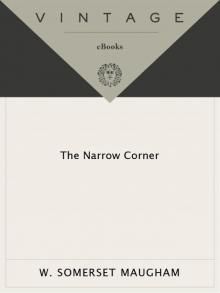 The Narrow Corner
The Narrow Corner Collected Short Stories Volume 3
Collected Short Stories Volume 3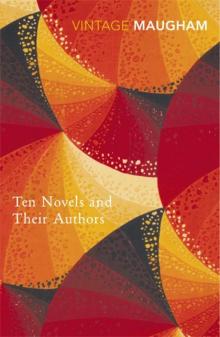 Ten Novels and Their Authors
Ten Novels and Their Authors Ashenden
Ashenden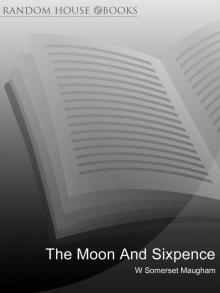 The Moon and Sixpence
The Moon and Sixpence Cakes and Ale
Cakes and Ale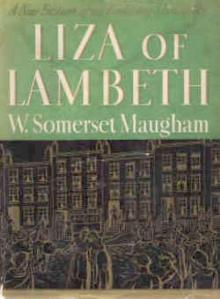 Liza of Lambeth
Liza of Lambeth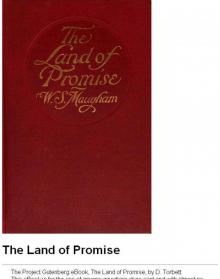 The Land of Promise: A Comedy in Four Acts (1922)
The Land of Promise: A Comedy in Four Acts (1922) A Writer's Notebook (Vintage International)
A Writer's Notebook (Vintage International)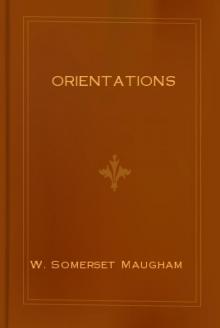 Orientations
Orientations Selected Masterpieces
Selected Masterpieces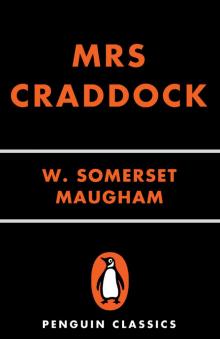 Mrs Craddock
Mrs Craddock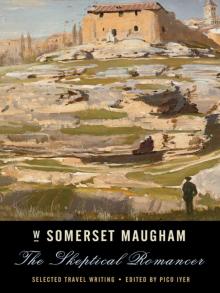 The Skeptical Romancer
The Skeptical Romancer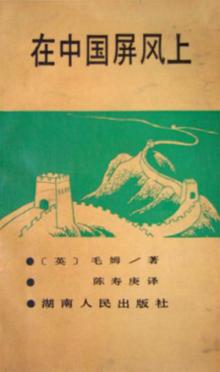 On a Chinese Screen
On a Chinese Screen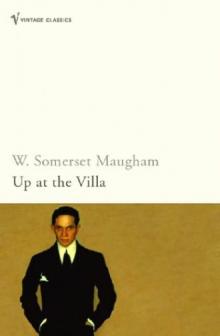 (1941) Up at the Villa
(1941) Up at the Villa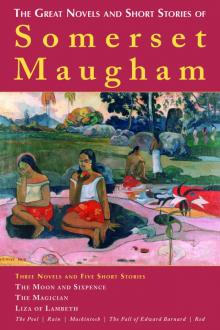 The Great Novels and Short Stories of Somerset Maugham
The Great Novels and Short Stories of Somerset Maugham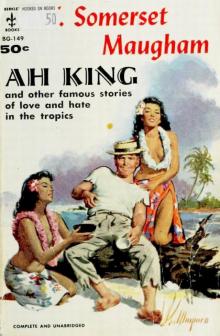 Ah King
Ah King The Explorer
The Explorer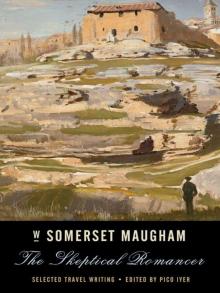 The Skeptical Romancer: Selected Travel Writing (Vintage Departures)
The Skeptical Romancer: Selected Travel Writing (Vintage Departures)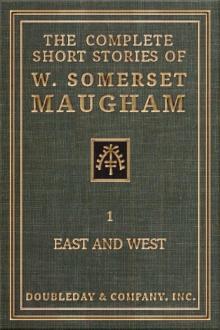 The Complete Short Stories of W. Somerset Maugham - I - East and West
The Complete Short Stories of W. Somerset Maugham - I - East and West